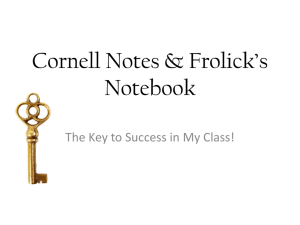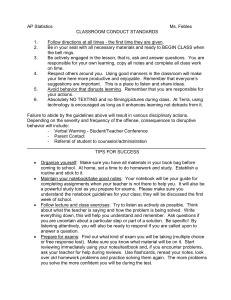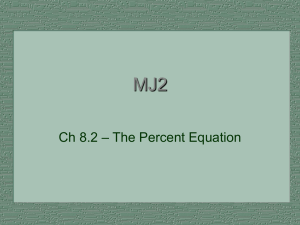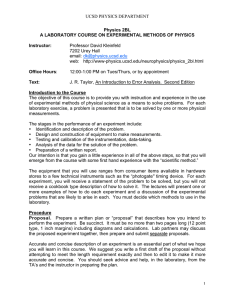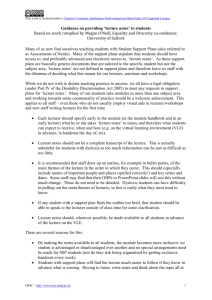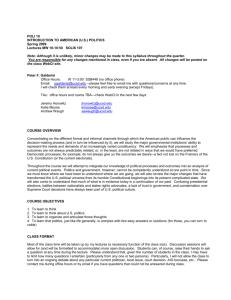Taking Lecture Notes
advertisement
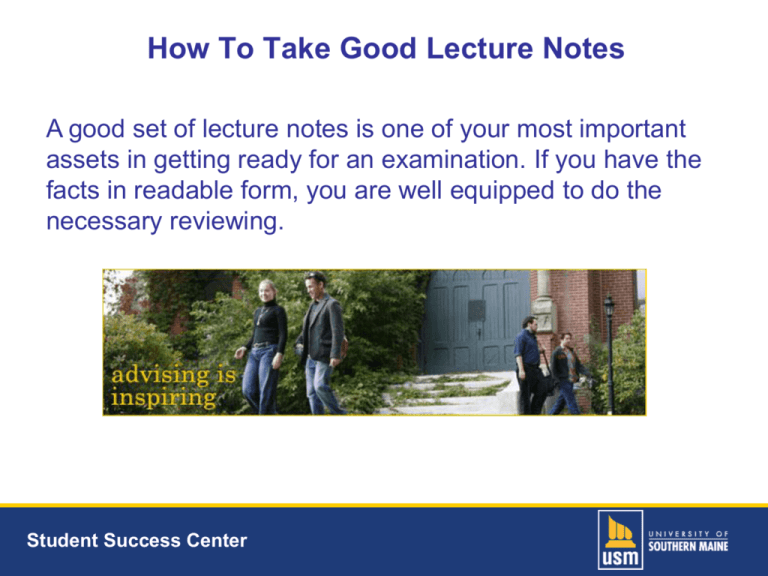
How To Take Good Lecture Notes A good set of lecture notes is one of your most important assets in getting ready for an examination. If you have the facts in readable form, you are well equipped to do the necessary reviewing. Student Success Center Three important findings from studies concerned with note taking: 1. Note taking helps you listen; it does not interfere with listening and comprehension. 2. Students who study their notes on a regular basis remember one and a half times more after six weeks than students who do not review. 3. Students who take no notes or do not study their notes forget approximately 80% of the lectures by the end of two weeks. Student Success Center Many students take notes in a very haphazard style claiming they will copy them later. However… …usually the notes don’t get copied and the originals are not much use after a few days or weeks have gone by, and …if the notes are copied, the information is garbled and difficult to make out. Student Success Center How Copying Your Notes Can Help You Copying over your class notes can aid in recalling the lecture and filtering out main points and topics. Copying your notes is a good way to create a “study guide” for future exams. But this will only work if you copy your notes as soon as possible after class! Student Success Center How do you take notes? What are some of the ways and styles you take notes? Does your style change for different classes you are in? If so, how does the style change per class? Student Success Center A Few Note Taking Styles Traditional Outline – works well with standard well organized lectures. Cornell – works well for organized lectures and for rewriting lecture notes. Mapping – works well for abstract lectures and class discussions. Student Success Center Traditional Outline 1. Traditional Outline a) Number subject b) Use letters or bullets for subheading 2. Things needed a) Lined paper b) Pencils c) Quiet work environment Student Success Center Area 2 The Cue Column. Use this space to help you recall the detail in the detail space. The Cornell System Create three areas on the page AREA 1 - The Details Use this space to write the lecture notes. Put all the details of the information you are learning about here. Area 3 - The Summary: Summarize the information you have detailed above. Use this space to put things in your own words. Student Success Center Mapping Mapping out your notes can be a helpful way to create a visual presentation of what you are trying to learn. Student Success Center Mapping notes can take many forms. The key is to use what works best for you Student Success Center Tips on Note Taking Collect notes for each course in one place, in a separate notebook or section of a notebook. Use different color notebooks for each subject. Write notes on one side of the page only. Use a loose-leaf notebook rather than a notebook with a permanent binding. This makes it easy to add supplemental information to your notes later on. Write the name and date of the class on the first sheet for each lecture. Use 8 1/2 x 11 sheets of paper for your notes. This size will allow you to indent and see the structure of your notes. Do not perform manual activities which will detract from taking notes. Do not doodle excessively or play with your pen. These activities break eye contact and concentration. Write your notes legibly so you can read them later. Student Success Center More Tips Use abbreviations such as &, lb., eg. etc… Box assignments and suggested books so you can identify them quickly. Mark ideas which the lecture emphasizes with an arrow or some special symbol. Pay close attention to transitional word such as "therefore", "finally", and "furthermore." They usually signal an important idea. Take down examples and sketches which the lecturer presents. Indicate examples with "EX." Review your notes as soon as possible. Read through the notes and improve the organization if necessary. Compare your notes with other classmates to see if you may have missed any important information. Student Success Center Listening and note taking are SKILLS you can develop. The more you practice these skills, the better you will become at recording the fastest lecturer to your satisfaction. Student Success Center Student Success Centers For more information on being a successful college student contact the Student Success Center. 119 Payson Smith Hall, Portland 780-4040 119 Bailey Hall, Gorham 780-5652 119 Lewiston-Auburn College, Lewiston 753-6500 or e-mail: studentsuccess@usm.maine.edu Student Success Advisors are available to help you. Student Success Center



